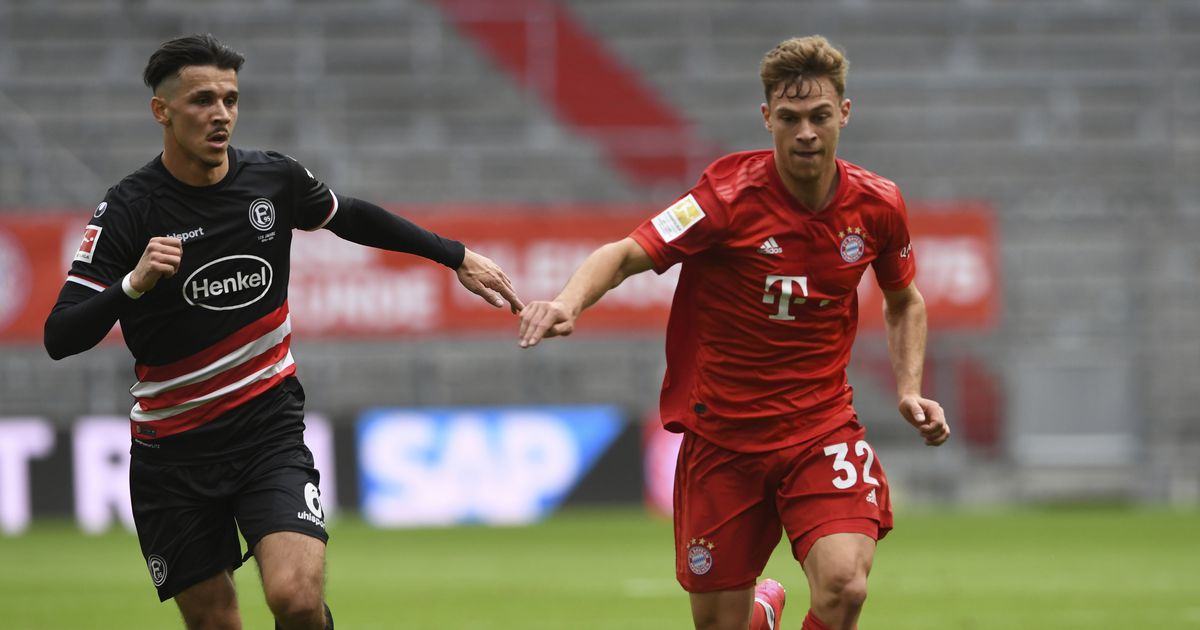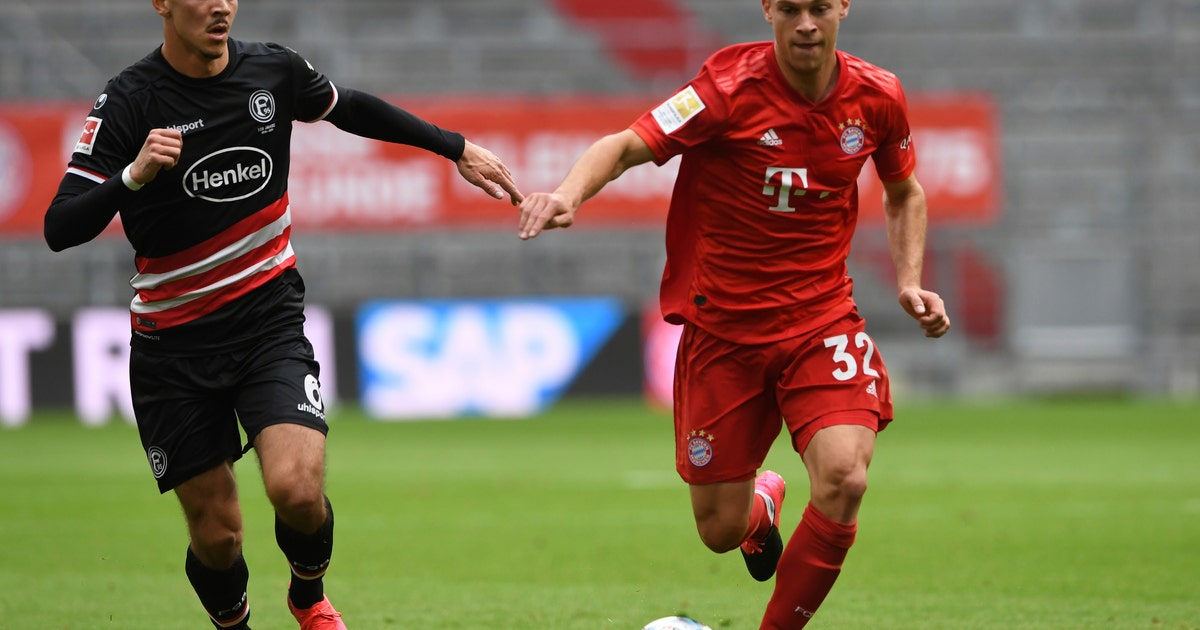Bayern’s Kimmich less emotional but calmer in fan-free games


The changed routines and rhythms around matches have been startling for Joshua Kimmich.
Playing for Bayern Munich in vast, empty stadiums has affected not just the spectacle — or lack of — but the game itself in the coronavirus era.
“Normally you have more adrenaline and more tension inside your body when you walk in and see the 80,000 fans,” Kimmich said in a video call from Munich. “Nearly everything has changed.”
The silence reminds Kimmich of playing in youth leagues. The supportive screams — and heckles — from the crowd are absent. The only chants are heard by viewers at home, inserted from the archives over live feeds.
“You have to push yourself, push your teammates, you have to be focused and more concentrated,” Kimmich said. “Normally when there are fans you are focused just because of that, because you know when you’re going to make a mistake, everybody is like, ‘Whoa,’ you feel this mistake more. Also, you feel more if you score a goal. It’s more emotional when there are fans.”
That isn’t always beneficial for match officials.
“I can feel that I am less emotional when I speak to the referee,” Kimmich said. “When they are loud and they are screaming you get pushed and you are more emotional and maybe you speak in another way with the referee.
“Now you can be more quiet and calm and speak in a normal way with the referee and you don’t have to shout at him and he doesn’t have to shout back.”
Communication within the team has also improved since the Bundesliga resumed last month with pandemic safety precautions preventing fans from attending.
“The stadium is always full at Bayern and it’s really amazing,” Kimmich said. “This is maybe what I miss the most but the positive thing is you can speak to everybody and maybe the focus is more on the game. It’s not like a show. Also, there is no more big show from the players any more – lying on the ground and screaming. It’s more focused on the game.”
The pick of the goals since the restart came from the boot of Kimmich, a chip from outside the penalty area — away at Borussia Dortmund. It sealed the win in Bayern’s biggest away game of the season.
“Especially against Dortmund, there is always a great atmosphere,” Kimmich said. “(No crowds mean) it’s more a disadvantage for the home team than for us.”
Winning on the road is nothing unusual for the defending champions. They won five in a row, stretching into December, before the league was paused. Since the restart, Bayern has won all four games — half away — to move seven points clear at the top of the Bundesliga.
For some teams losing home advantage is more unexpected, when it isn’t a powerhouse like Bayern visiting.
Only 22% of games — eight — have been won at home since the resumption, a slump from 40% before the coronavirus-enforced break.
German teams with a reputation for passionate home fans are struggling more than most. Cologne and Union Berlin, who have modest budgets but a reputation for overwhelming visiting opponents in a cauldron of noise, are four games without a win.
Kimmich has already played four times in two weeks, an overall concern by the international players’ union FIFPRO about the increased risk of injuries. FIFPRO warned the burden on players’ bodies to complete the season is intense.
Kimmich said he’s holding up, so far.
“(The restart) was OK for us, because it was like a third preseason,” he said.
“We worked a lot, first at home with the cyber-training and after in smaller groups, then with the whole team. Now we have the benefit of it. The games were really good for us, I think we played good, we had good results, and also the physical factor is really important for us.”
But there has been a higher rate of injuries across the Bundesliga compared to earlier in the season, although many have been relatively light cases of muscle strains or bruising, rather than anything requiring months of treatment.
Dortmund’s title challenge has been hampered by a wave of minor injuries to players who would usually be in the starting lineup. Forward Jadon Sancho and defensive midfielder Emre Can were unable to start the 1-0 defeat to Bayern.
“We don’t have (any) muscle injuries,” Kimmich said. “But it could be a problem in the future, when the new season starts, because we won’t get a long holiday.”
To the end of the year, teams can use five substitutes, two more than are usually allowed in 90 minutes. It provides coaches with more flexibility with their tactics and the ability to rotate squads to keep players fresh.
The main medical checks, though, are ensuring players are not spreading the coronavirus. That means wearing face masks around hotels and on the drive to stadiums. They also sit apart for meals and are tested for COVID-19 every few days.
“As a club we know that we are all responsible for each other so we have to follow the distancing,” Kimmich said. “For us it is really safe. Here in Germany we are the role model for other countries.”
The Bundesliga was the first major league to resume in Europe. England, Italy and Spain are due to follow but France abandoned its season in April.
“Not everybody thinks that it’s good football is coming back,” Kimmich said. “But the system is good.”
The downside will be no party in Munich’s main square if an eighth successive title is clinched.
“This year we have to drink all the beer,” Kimmich said. “It is strange, of course. It is better to win it with the fans, but we don’t have the choice now.”






